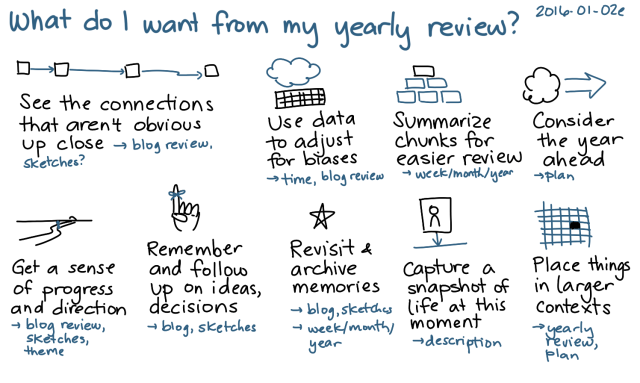What do I want from my review process?
| writingI've just finished reviewing 2015. I reread my blog posts, reviewed my photos, analyzed my time, and wrapped it up in a summary that surprised my recency-biased brain. It turned out to have been a pretty good year, even though I had felt a little bit lost and frazzled at times.
It got me thinking about what I want from my daily/weekly/monthly/yearly review process. What would I like to tweak for next time?
This year, my index cards turned out to be an convenient graphical way to roll up everyday notes into larger and larger chunks. I even have some code to make it easier to create montages of lower-level sketches (for example, the daily sketches when I'm doing a weekly review) and include them as a layer in my drawing program so that I can choose the highlights for redrawing. Some days, I didn't have much to draw. Other days, I overflowed with things I wanted to remember. Being able to quickly jot a few keywords or make a quick card kept me rolling even when my mind was too fuzzy to write a blog post, so that worked out wonderfully.
I think next year will be pretty similar. With that in mind, I'd like to get better at using my reviews to:
- See the connections that aren't obvious: Sometimes a thought weaves its way in and out of my mind over a long period of time, or sometimes several ideas are fascinating when juxtaposed. My working memory tends to be more limited when I'm fuzzy-brained, so it's hard to see those connections. If I reread a bunch of posts in quick succession or I shuffle my index cards somewhat randomly, though, that can help me see those links. This tends to kick in for the monthly and yearly reviews. It might be interesting to see if I can get this working longer-term, too.
- Use data to adjust for biases: I notice I have a strong recency bias when I'm fuzzy-brained. Recent experiences colour my perception and make certain things easier or harder to remember. Both analyzing data and reviewing archives can help me counteract that bias and get a better view of what happened. In general, I've tended to underestimate progress and be pleasantly surprised during review. I wonder if that means I tend to pessimistically evaluate day-by-day progress, and if tweaking that would result in a positive effect on motivation and momentum.
- Get a sense of progress and direction: This is good for celebrating progress and catching drift. I tend to not have fixed goals as much as general directions, so drift could be a little harder to notice. It's still interesting to play spot-the-differences with my past selves, though.
- Summarize chunks for easier review: I don't need to remember all the details from each day. It's nice to have memory hooks for the highlights, though. Reviewing and chunking periods of time helps me make sense of longer and longer periods. I wonder if it makes sense for me to do quarters or seasons as a step in between months and years…
- Remember and follow up on ideas, decisions; consider what's coming up: Sometimes the review reminds me of something I want to follow up on, a decision I want to revisit, or an idea I'd like to try. I could get better at this by explicitly calling out things to revisit and scheduling reminders for myself. That's one of those tips for managing oneself, after all.
- Revisit and archive memories: I'm not particularly sentimental, and there are few memories that I deliberately revisit outside the context of a conversational reference. That might be something worth playing with, though – maybe as a way to understand life more, maybe as a source of ideas for future experiments, and maybe something that can eventually become another source of happiness or satisfaction? Hmm.
- Capture a snapshot of life at this moment: Related to archiving memories: sometimes it's helpful to capture the everyday, ordinary things, since that can be unexpectedly interesting when looking back.
- Place things in larger contexts: I don't do nearly enough of this, I think: seeing things in a larger context, with a longer-term perspective. I occasionally check things against 5- or 10-year periods, and sometimes against expected lifespan, but there isn't that sense of deep understanding yet, and it's still mostly limited to my own scope. I do some wider reflections from time to time, borrowing the Stoic practice of remembering that things are transitory and insignificant. I think a larger perspective will probably develop over time; might be a wisdom thing.
Practically speaking, that probably translates to:
- Continue drawing daily/weekly/monthly index cards, possibly with more details and observations.
- Consider drawing a quarterly round-up too: maybe the previous quarter + three monthly cards.
- Organize my notes on decisions for review, including predicted consequences and reasons for choosing, and schedule reminders for them.
- Write or draw memories, maybe organizing them by person/trigger, and reflect on them from time to time.
- See if I can get better at explicitly linking small day-to-day steps with my bigger picture, and celebrating those small steps instead of waiting for the monthly or yearly review to make sense of them.
Hmm….

